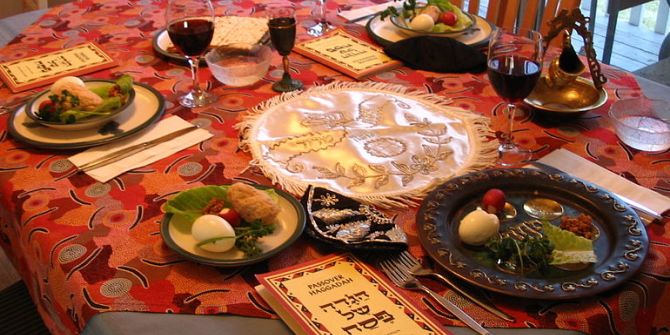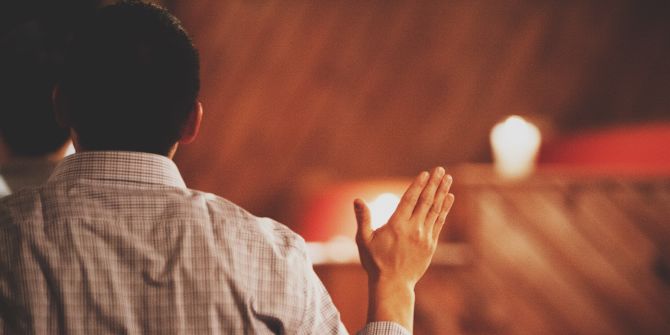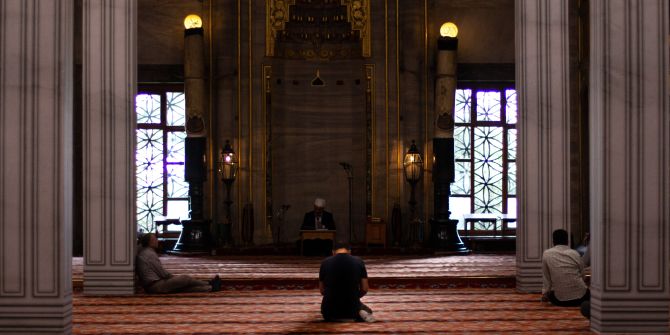With this year’s Passover celebrations disrupted by the coronavirus pandemic, Marina Sapritsky-Nahum draws on her research in presenting to us the change and continuity within London’s Jewish communities. A time of remembering and recounting ancient traditions, Passover 2020 brings with it a creative reimagining of the Jewish festival and the communal life that is its heart.

“Next Year Together” will probably replace “Next Year in Jerusalem”, the famous phrase which Jews around the world utter as they conclude their Passover celebrations.
As Jews in London get ready to retell the story of Passover and to celebrate their exodus from Egypt, many reflect on the confinement and isolation they find themselves in following the “stay at home” call made by religious leaders to heed UK government advice on slowing the spread of COVID—19. For some Jews, isolation and social distancing goes against everything Judaism stands for and undermines their biggest strength: standing together as a community.
For a number of young Jewish families in central London I speak with as part of my ongoing research on Global Judaism and Transnational Jewish Identities, isolation has, however, created the space and time to be more connected with their own nuclear family, bringing Jewish teachings and history to life through new traditions in the comfort of their homes.
This challenging time also presents many parents with the opportunity to become the Jewish educators of their own household, much like many have become teachers overnight in the wake of school closures. Even for existing Jewish educators, this year’s Passover celebration presents a new obstacle. ‘I want my children to look back and instead of saying “that was a COVID-19 Passover” I want them to say, “that was the most memorable Passover ever”’, an Orthodox Rabbi from Central London shares with me. ‘Since I was 11 or 12 years old my Passovers have been about bringing the beauty and joy of Yidishkite [a Yiddish term, loosely translated as Jewishness or Jewish life] to other communities in need, and I was always travelling. This is the first time I will ever be sitting down with my own family’, he explains.
Passover is one of the most celebrated Jewish festivals around the world. It is one of the three Pilgrimage Festivals (Shalosh Regalim) during which Jews historically made a pilgrimage to the Holy Temple in Jerusalem. It is a week-long holiday where Jews, among other things, trade in bread for Matzah and give up eating leavened products to commemorate the quick overnight escape from Egypt, led by Moses, and the dire conditions in which Jews survived with just the bare necessities.
The Passover celebration starts with a feast called the Seder (“order” in Hebrew) – one of the oldest surviving rituals in the Western world, which some scholars argue dates back over 3,300 years. The Seder meal is guided by the leader of the ceremony and others reading aloud from the Hagada book (translated from Hebrew as “relate” or “tell”). The Hagada retells the story of Jewish exodus and guides its participants through the rituals, prayers and songs of the evening, helping the younger generations to understand ‘why this night is different from all others’. The importance of the festival is in the telling of the story that is passed down from generation to generation and in the communal and festive nature of its celebration. The famous phrase in the Hagada – ‘Let all those who are hungry come in and eat’ – goes back to the time of the Temple when Jews were not allowed to eat the sacrificial meat alone and had to invite others so that no meat was left over.
This year, Jews find themselves in a difficult place to celebrate liberation as their own families, like everyone else, face quarantine, self-isolation, scarcity of food and social distancing. Not only are Jewish families unable to invite strangers into their homes, as is customary, they cannot even share the Seder with grandparents and dear friends. Some are completely alone during this pandemic. Religious leaders have been instrumental in helping members of their communities battle the anxiety of celebrating liberation in isolation through WhatsApp messages posted to group chats that draw out lessons of Jewish resilience, comment on historical parallels and encourage a deeper connection with God.
Community outreach projects such as Seder-to-Go, organised by Chabad Lubavitch UK and distributed in partnership with Deliveroo provide all of the essential elements to prepare a Seder table while spreading the message “Freedom is not limited to where you are.” The 4,000 plus boxes delivered across the UK are a saving grace for many who are unable to source the necessary food for the holiday, or who need a step-by-step guide to doing a Seder. Unable to lead a communal Seder for their congregants, many religious leaders are also offering “how-to” crash courses online. I joined a Zoom class called DIY Seder led by the Rabbi quoted above, and stayed for the follow-up talk, “How to Child-Proof Your Seder”, led by his brother. Some online congregants were busy taking notes, others copied links for useful activities and many simply joined to get the general gist of how to do it.
Unable to celebrate in larger groups, each family is faced with the responsibility of leading the Seder themselves. This shift in authority has proved to be a great impetus for many less-observant families who previously relied on the Rabbi or other more observant members of the community to lead the night. ‘The inability to call on others is a great motivator for studying, learning and growing’, the DIY Seder Rabbi explains. Jews are not only learning through more “official” online courses offered by their religious leaders but also through one another. ‘What am I mean to put on a Seder plate?’, one of my friends asks on a group chat. In response, someone posts a picture of a Seder plate with drawings of the symbolic food, numbered and described.
Although some families are keen to have the “right” instruction on how to lead a Seder, others see it as an opportunity to invent new traditions and to engage their children while doing it. ‘There is excitement present in planning for Passover,’ a young Jewish woman tells me. ‘We have never done Passover only as a little family, so we will do our best to make it memorable and the kids will be very much involved in the preparation. We are planning on making matzah together’, she concludes. Another young mother shares the same positive sentiment amid the new reality of isolation: ‘It will be our first Seder “alone” and we will try to make the most out of it. We have more time to sit with our children and explain to them the meaning of the prayers. This crisis makes us miss our extended family, but it gives us the chance to connect with our children on another level and to transmit them spirituality.’
Having a free agenda, and a slower rhythm of life, allows many Jewish families to engage with Jewishness. Living through a global crisis, some might argue, forces many to question their relationship with themselves, with others and with God. But unlike the joke where God tells people, “Now that I have cleared your diary, let’s speak,” many of the traditional but non-observant Jewish families I spoke to do not see themselves becoming “more religious”, even if they are becoming “more Jewish.”
The call for religiosity, spirituality, even creativity, at a time of crisis is not specific to Jews or to today’s crisis. Rather, it is part of a wider need. Not everyone is turning to God, but many are turning to one another, re-making traditions that bind them as a family and as a community and doing this virtually across the world. Traditions are what Jews have always valued and passed on to their children. In today’s global yet isolated world, traditions are not just handed down; they are also made.
Note: This piece gives the views of the author(s), and not the position of the LSE Religion and Global Society blog, nor of the London School of Economics.






Marina it so nice to know about your involvement it this topic. Proud of you. Good luck on your efforts 👍👌Stay health y.
Hag Sameah!
Excellent article! Thank you for sharing inspiration at a time we are all trying to figure out what comes next.
Thank you for putting this together! It’s wonderful. Traditions and family are so important, and we are using this challenging time to build on our traditions and creativity new ones with our family.
Beautifully written . We were so grateful to be able to have used Seder in a box and like many other families carried out our Seder on Zoom this year , but for the first time we included our extended families from around the world and it was made even more meaningful to have us all there together .I used to , no doubt like many of us , take these moments of togetherness for granted one thing I will never do again !
Marina
What a wonderful article. Where I grew up in Manchester there was a large Jewish community and I had Jewish friends at school. I was always pleased to get the invitation to join the Seder. I have also been researching how religious groups are moving to live streaming via You tube and Zoom. One large church in west London has seen double the number of family units join in on line. Hopefully lessons on how better to communicate faith for a secular age will be learned.
Great piece of work